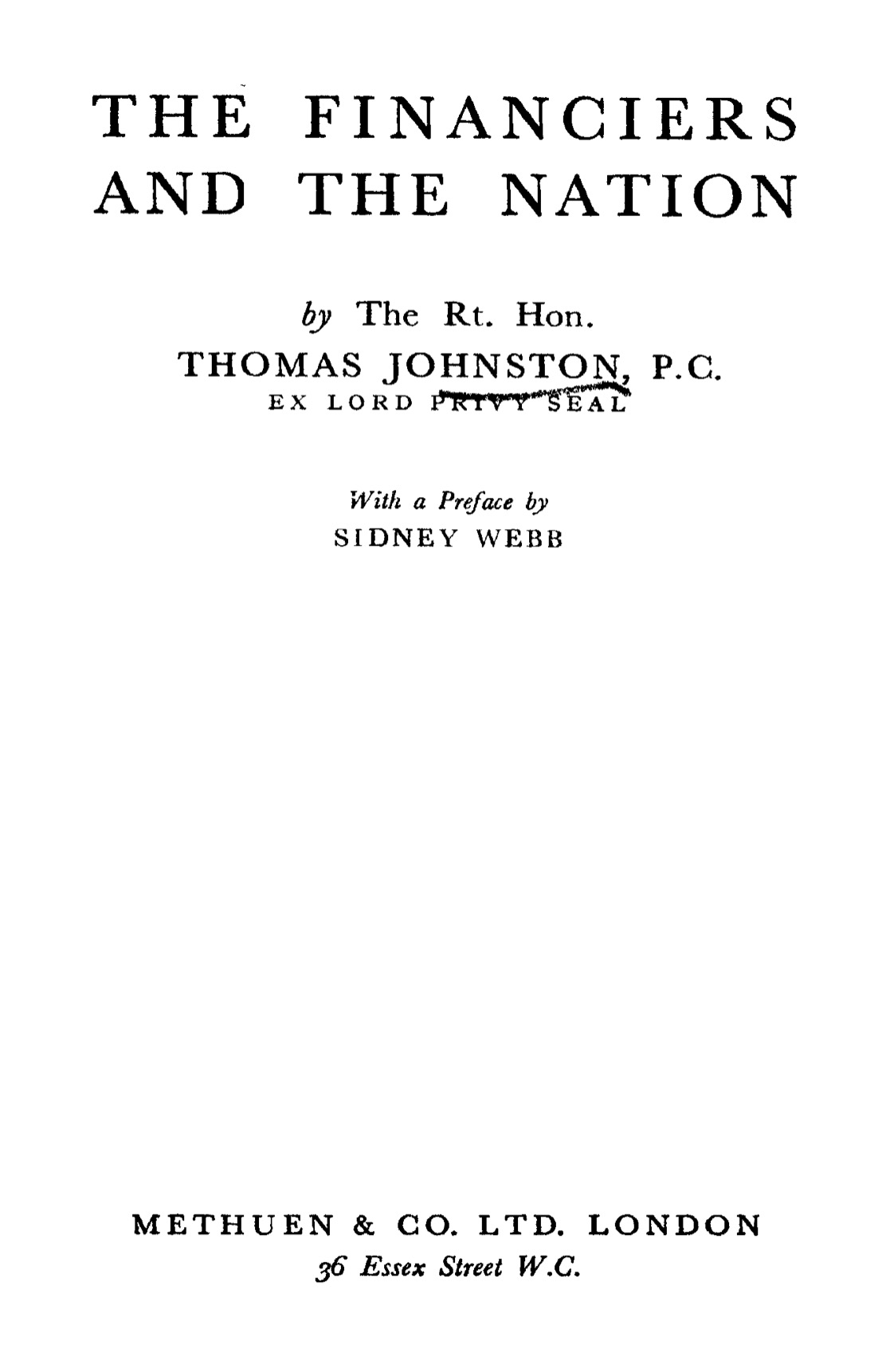Thomas Johnston & Sidney Webb (Preface)
The Financiers And The Nation (1934)

Preface by SIDNEY WEBB
I REGARD Mr. Johnston's book as of great public service. We cannot be too plainly reminded of the way in which the public is periodically fleeced by financial tricksters and swindlers ; because these highlights of capitalist enterprise are, after each exposure, quickly forgotten.
It is remarkable how regularly during the past hundred years the story is repeated. Each decade sees a new variant, but the process is essentially the same. Tens of thousands of small investors, and also some large ones, are persuaded by lies and misrepresentations to purchase shares in what is simply a swindle. Hundreds of thousands, if not millions, of pounds are pocketed by the swindlers and the crowd of accomplices and parasites who 'in the ordinary course of business' co-operate in what must not yet be termed fraud. Presently there is a collapse, and, more or less, exposure : occasionally one or more of the chief swindlers gets prosecuted and sentenced to prolonged imprisonment at the public cost. But there is no effective or prolonged publicity.
All the influences 'in the City' combine to hush things up. Any angry talk is bad for business on the Stock Exchange. The banks fear the spread of panic and conceal their own losses. The newspapers are warned on behalf of influential people that any financial scandal interferes with legitimate business, and especially with the advertising of 'promoters'. And so to the interest of the public in the latest financial swindle dies down. The figure of losses is concealed. Presently the crowd of small investors are ready to be robbed again, in some new guise.
Meanwhile, it should be noted, hundreds of little swindles are carried on to the detriment of the public, without any overt criticism or public denunciation. How large is the proportion of rubbish among widely advertised sometimes 'capitalized' monstrous price extracted from the investing public, from patent medicines to cheap glow-lamps, no one has ventured to compute. I do not remember that any professional economist has taken the trouble to estimate the total 'exchange value' during any one year of the various kinds of 'illth' that masquerade as 'wealth.'
Mr. Johnston's plain-spoken account of a dozen or so of the most spectacular of these swindles will, I fear, seem to some people almost indecent. To the honest and respectable banker, or the old-established stockbroker specializing in investment business, or the steady-going manufacturer producing a sound article, it will certainly seem in the highest degree unfair to class all sorts of swindling, along with their own upright service, as part of "the capitalist system."
Their protest would secure more support were it not for one fact. It is just these honest and respectable business people who make possible the hushing-up of the various successive scandals. If they united to demand public investigation and effective publicity the public would not be able so quickly to forget, and the new variant that the swindlers are even now elaborating would have to be postponed. But there is a more serious civic offence of which the banks and the Stock Exchange and such bodies as the Federation of British Industries are habitually guilty. Whenever the Government, or some important members of Parliament, are at last moved to devise some legislative reform,, which would make the successive financial swindles more difficult or more dangerous to the perpetrators, there is only the faintest support from 'the City.'
Presently, indeed, memoranda begin to pour in, showing that the proposed new restrictions to prevent swindling, or the suggested additional requirement in the revelations of promoters' would c interfere with prospectuses, legitimate business. The desired reforms are obstructed, whittled down and often prevented. That legitimate concern for their own profits, which the honest and respectable financiers are so prompt to manifest, actually keeps open the door for renewed swindles. It is even argued that the losses from such swindles are the price that has to be paid for industrial and financial freedom. It is a drawback that the price is not paid by those who get the profits of that freedom ! This attitude of the honest and respectable bankers, the old-established stockbroker doing investment business, and the steady-going manufacturer producing a sound article, is what justifies, and even compels, our inclusion of all the swindles, great and small, in the capitalist system for which the nation relies for nearly all its production and distribution of wealth. It would? indeed, be unfair to blame the bankers, the stockbrokers, and the manufacturers for causing the swindles. The proceedings of Hatry or Kreuger, Bottomley or Farrow, White or Loewenstein ; or those of the more shady of the issuers of foreign loans, or new amalgamations, are not actually caused by the capitalist system.
But I think we are warranted in concluding, from the history of the past hundred years, that are what the they logicians used to call 'inseparable accident8 of such a system. And it is the honest bankers, the respectable stockbrokers, and steady-going manufacturers, who, whenever the question of reform arises, in effect tell us that are 'inseparable' from their essential freedom to make profits.
Mr. Johnston has useful sections on such improvements in the system as the effective nationalization of the Bank of England ; the development of municipal banks like that of Birmingham, established by so reckless a Socialist as the present Chancellor of the Exchequer ; the throwing open to wider utility of the Post Office Savings Bank ; and the planning and direction of a capital investment Board. These are all reforms that have received high expert support. I must refrain from doing more here than invite the reader's special attention to them.
Downloads and Links
- Download The Financiers And The Nation (1934) by Thomas Johnston & Sidney Webb - PDF (10.1 MB) - 234 pages.
- Read The Financiers And The Nation on The Internet Archive and download in different formats
- Web search for the book by author and title
